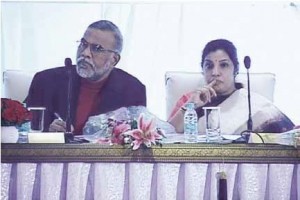CREATIVITY AND INNOVATION IN NEW SCHOOL CURRICULUM
 New methodologies of accountability and transparency are to be seen in the educational institutes in the year 2010 with the All India Council for Technical Education (AICTE) introducing sweeping reforms in the higher education sector. With these changes the recognised colleges would be expected to display online their institute’s fee details, faculty components and admission related details, respectively. The Human Resource Development (HRD) Minister Kapil Sibal is expected to soon announce these reforms and the names of the colleges that are recognised by AICTE will have to declare their entire fees, its components, refundable portions on withdrawal of admission, number of seats per course, eligibility conditions, admission and selection process, details of teaching faculty, including their pay and qualifi cations, the institute’s physical and academic infrastructure and syllabus outline.
New methodologies of accountability and transparency are to be seen in the educational institutes in the year 2010 with the All India Council for Technical Education (AICTE) introducing sweeping reforms in the higher education sector. With these changes the recognised colleges would be expected to display online their institute’s fee details, faculty components and admission related details, respectively. The Human Resource Development (HRD) Minister Kapil Sibal is expected to soon announce these reforms and the names of the colleges that are recognised by AICTE will have to declare their entire fees, its components, refundable portions on withdrawal of admission, number of seats per course, eligibility conditions, admission and selection process, details of teaching faculty, including their pay and qualifi cations, the institute’s physical and academic infrastructure and syllabus outline.
GOVERNMENT STUDYING FROG SYSTEM E-EDUCATION
It was told by the Deputy Prime Minister, Tan Sri Muhyiddin Yassin,that the government was studying an eeducation method named ‘Frog System’. The system was already being practiced in several schools in the United Kingdom and was being studied with an objective of being implemented in Malaysia, if found suitable.
According to Muhyiddin, the Education Minister, the method was quite effective and was expected to enhance learning and teaching. He added that government is putting all its effort to ensure that the quality level of education in schools could be enhanced, especially relating to technology developments in ICT and that this enhancement can support the country to ‘leap frog’ further ahead.
RANASINGHE, SRI LANKAN PIONEER IN IT EDUCATION AND TRAINING
 The pioneer of the leading Computer and Information T e c h n o l o g y T r a i n i n g Academies with over 50 branches i s l a n d – w i d e covering all the provinces in the country, Dr. Bandusena Ranasinghe is another eminent personality from University of Peradeniya. He is the Chairman or in other words founder of the IDM Group of Companies. The academies under his guidance have donated almost 900 IT graduates to the country other than several thousands IT Diploma holders. IDM also provides and supports opportunities for direct employments of above fi ve hundred people within the IDM group.
The pioneer of the leading Computer and Information T e c h n o l o g y T r a i n i n g Academies with over 50 branches i s l a n d – w i d e covering all the provinces in the country, Dr. Bandusena Ranasinghe is another eminent personality from University of Peradeniya. He is the Chairman or in other words founder of the IDM Group of Companies. The academies under his guidance have donated almost 900 IT graduates to the country other than several thousands IT Diploma holders. IDM also provides and supports opportunities for direct employments of above fi ve hundred people within the IDM group.
PHILIPPINES TO HOST 45TH SEAMEO CONFERENCE AND 5TH ASEAN MEETING OF MINSTERS OF EDUCATION
 Two annual conferences of the Southeast Asian Ministers of Education Organization, the 45th SEAMEO Council Conference (SEAMEC) and the 5th ASEAN Meeting of Ministers of Education (ASED), are being hosted by the Philippines at the Shangri- La Hotel in Cebu on January 26-29. The aim of the back-to-back conferences is to foster stronger cooperation on education among Southeast Asian countries and beyond. The 10 collaborative projects of the SEAMEO member states that aim at providing education to the oorly-served communities in the region, have been given the top priority in the agenda. The Department of Education (DepEd) said President Gloria Macapagal-Arroyo will grace the opening ceremony as the guest
Two annual conferences of the Southeast Asian Ministers of Education Organization, the 45th SEAMEO Council Conference (SEAMEC) and the 5th ASEAN Meeting of Ministers of Education (ASED), are being hosted by the Philippines at the Shangri- La Hotel in Cebu on January 26-29. The aim of the back-to-back conferences is to foster stronger cooperation on education among Southeast Asian countries and beyond. The 10 collaborative projects of the SEAMEO member states that aim at providing education to the oorly-served communities in the region, have been given the top priority in the agenda. The Department of Education (DepEd) said President Gloria Macapagal-Arroyo will grace the opening ceremony as the guest
of honor on January 27.
INDIVIDUALS WITH SPECIAL NEEDS TO ACQUIRE ICT EQUIPMENT
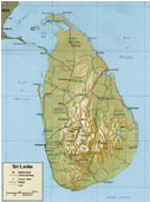 General Priyantha Kariyapperuma, Director, Telecommunication Regulatory Commission of Sri Lanka told that an opportunity to use technology should be given to those with special needs. Technology is essential to understand world trends and people who are differently-abled should not be discriminated against when it comes to accessing technology.
General Priyantha Kariyapperuma, Director, Telecommunication Regulatory Commission of Sri Lanka told that an opportunity to use technology should be given to those with special needs. Technology is essential to understand world trends and people who are differently-abled should not be discriminated against when it comes to accessing technology.
LKR 8.5 million wroth of ICT equipment was handed over to to schools, vocational training centres, Ranaviru Villages and Universities for persons with special needs under the International Telecommunication Union and Telecommunication Regulatory Commission Sri Lanka project program with the theme information communication technologies for dis-empowered and marginalized communities, in a ceremony.
Computer tables and chairs, multimedia projections, Braille software, FM hearing equipment for hearing impaired children, photocopy machines were provided for 69 centers including two universities, 33 schools, 17 vocational training centres and 17 Ranaviru villages.
EDUCATIONAL TIES BETWEEN BRUNEI DARUSSALAM AND THAILAND
A MoU was signed between Brunei Darussalam and Thailand as part of an effort to further boost the educational ties.
The two countries will see an exchange of educational knowledge as well as human resources and students in the future. This would be one of the main agenda’s set during the fl agship educational project visit to Thailand, which is to take place between January 24 and February 2.
A delegation comprising three offi cers from Universiti Brunei Darussalam will be accompanying four local UBD students and four Muslim Thai students on a visit to Thailand’s different educational institutions in an effort to forge cooperation in the fi eld of education.










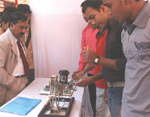 New methodologies of accountability and transparency are to be seen in the educational institutes in the year 2010 with the All India Council for Technical Education (AICTE) introducing sweeping reforms in the higher education sector. With these changes the recognised colleges would be expected to display online their institute’s fee details, faculty components and admission related details, respectively. The Human Resource Development (HRD) Minister Kapil Sibal is expected to soon announce these reforms and the names of the colleges that are recognised by AICTE will have to declare their entire fees, its components, refundable portions on withdrawal of admission, number of seats per course, eligibility conditions, admission and selection process, details of teaching faculty, including their pay and qualifications, the institute’s physical and academic infrastructure and syllabus outline.
New methodologies of accountability and transparency are to be seen in the educational institutes in the year 2010 with the All India Council for Technical Education (AICTE) introducing sweeping reforms in the higher education sector. With these changes the recognised colleges would be expected to display online their institute’s fee details, faculty components and admission related details, respectively. The Human Resource Development (HRD) Minister Kapil Sibal is expected to soon announce these reforms and the names of the colleges that are recognised by AICTE will have to declare their entire fees, its components, refundable portions on withdrawal of admission, number of seats per course, eligibility conditions, admission and selection process, details of teaching faculty, including their pay and qualifications, the institute’s physical and academic infrastructure and syllabus outline.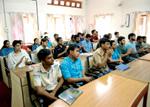 The academic year 2010 – 2012 at The National Institute of Technology, Calicut (NIT-C) – School of Management Studies is to focus on technology management for its MBA programme, which will be open only to B.Tech/B.Arch/BE/B.Sc engineering degree holders. Admission to the course will be based on marks scored in the Indian Institutes of Management (IIMs) Common Admission Test CAT) however, fi nal admission will be based on the candidate’s performance in the Bachelor’s degree examination, group discussion and interview. Group
The academic year 2010 – 2012 at The National Institute of Technology, Calicut (NIT-C) – School of Management Studies is to focus on technology management for its MBA programme, which will be open only to B.Tech/B.Arch/BE/B.Sc engineering degree holders. Admission to the course will be based on marks scored in the Indian Institutes of Management (IIMs) Common Admission Test CAT) however, fi nal admission will be based on the candidate’s performance in the Bachelor’s degree examination, group discussion and interview. Group New methodologies of accountability and transparency are to be seen in the educational institutes in the year 2010 with the All India Council for Technical Education (AICTE) introducing sweeping reforms in the higher education sector. With these changes the recognised colleges would be expected to display online their institute’s fee details, faculty components and admission related details, respectively. The Human Resource Development (HRD) Minister Kapil Sibal is expected to soon announce these reforms and the names of the colleges that are recognised by AICTE will have to declare their entire fees, its components, refundable portions on withdrawal of admission, number of seats per course, eligibility conditions, admission and selection process, details of teaching faculty, including their pay and qualifi cations, the institute’s physical and academic infrastructure and syllabus outline.
New methodologies of accountability and transparency are to be seen in the educational institutes in the year 2010 with the All India Council for Technical Education (AICTE) introducing sweeping reforms in the higher education sector. With these changes the recognised colleges would be expected to display online their institute’s fee details, faculty components and admission related details, respectively. The Human Resource Development (HRD) Minister Kapil Sibal is expected to soon announce these reforms and the names of the colleges that are recognised by AICTE will have to declare their entire fees, its components, refundable portions on withdrawal of admission, number of seats per course, eligibility conditions, admission and selection process, details of teaching faculty, including their pay and qualifi cations, the institute’s physical and academic infrastructure and syllabus outline. The pioneer of the leading Computer and Information T e c h n o l o g y T r a i n i n g Academies with over 50 branches i s l a n d – w i d e covering all the provinces in the country, Dr. Bandusena Ranasinghe is another eminent personality from University of Peradeniya. He is the Chairman or in other words founder of the IDM Group of Companies. The academies under his guidance have donated almost 900 IT graduates to the country other than several thousands IT Diploma holders. IDM also provides and supports opportunities for direct employments of above fi ve hundred people within the IDM group.
The pioneer of the leading Computer and Information T e c h n o l o g y T r a i n i n g Academies with over 50 branches i s l a n d – w i d e covering all the provinces in the country, Dr. Bandusena Ranasinghe is another eminent personality from University of Peradeniya. He is the Chairman or in other words founder of the IDM Group of Companies. The academies under his guidance have donated almost 900 IT graduates to the country other than several thousands IT Diploma holders. IDM also provides and supports opportunities for direct employments of above fi ve hundred people within the IDM group. Two annual conferences of the Southeast Asian Ministers of Education Organization, the 45th SEAMEO Council Conference (SEAMEC) and the 5th ASEAN Meeting of Ministers of Education (ASED), are being hosted by the Philippines at the Shangri- La Hotel in Cebu on January 26-29. The aim of the back-to-back conferences is to foster stronger cooperation on education among Southeast Asian countries and beyond. The 10 collaborative projects of the SEAMEO member states that aim at providing education to the oorly-served communities in the region, have been given the top priority in the agenda. The Department of Education (DepEd) said President Gloria Macapagal-Arroyo will grace the opening ceremony as the guest
Two annual conferences of the Southeast Asian Ministers of Education Organization, the 45th SEAMEO Council Conference (SEAMEC) and the 5th ASEAN Meeting of Ministers of Education (ASED), are being hosted by the Philippines at the Shangri- La Hotel in Cebu on January 26-29. The aim of the back-to-back conferences is to foster stronger cooperation on education among Southeast Asian countries and beyond. The 10 collaborative projects of the SEAMEO member states that aim at providing education to the oorly-served communities in the region, have been given the top priority in the agenda. The Department of Education (DepEd) said President Gloria Macapagal-Arroyo will grace the opening ceremony as the guest General Priyantha Kariyapperuma, Director, Telecommunication Regulatory Commission of Sri Lanka told that an opportunity to use technology should be given to those with special needs. Technology is essential to understand world trends and people who are differently-abled should not be discriminated against when it comes to accessing technology.
General Priyantha Kariyapperuma, Director, Telecommunication Regulatory Commission of Sri Lanka told that an opportunity to use technology should be given to those with special needs. Technology is essential to understand world trends and people who are differently-abled should not be discriminated against when it comes to accessing technology.
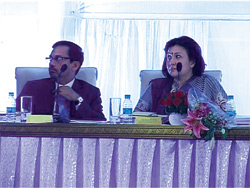 Secondary Education are to provide Quality Education and employability skills – this it is envisaged will meet the requirements of Industry and generate effi cient human capital. The 11th Five Year Plan known as the Education Plan has allocated large budgets for the Education Sector and recommended that Public-Private Partnerships (PPP) should be adopted by the Education Sector to reach Quality Education to all sectors of society. IL&FS Education and Technology Services Limited organised the Second National Consultative Meet on Public- Private Partnerships in Education on
Secondary Education are to provide Quality Education and employability skills – this it is envisaged will meet the requirements of Industry and generate effi cient human capital. The 11th Five Year Plan known as the Education Plan has allocated large budgets for the Education Sector and recommended that Public-Private Partnerships (PPP) should be adopted by the Education Sector to reach Quality Education to all sectors of society. IL&FS Education and Technology Services Limited organised the Second National Consultative Meet on Public- Private Partnerships in Education on